Help Brick
Slave Families
& Children
Families are force to work as Slave at bricklin
Just because they Took Loan from Brick Owner



Together we can
Help families
freed from Slavery

Saving World with Good Designs. Because
your satisfaction is everything.





Lets Make change by
Helping Families
We Cannot Help Everyone But Everyone can Help Someone

Detail About Brick
What is Brick Slave or Bonded Labor
Bonded labor, also known as debt bondage, is a form of modern-day slavery at Brick Klins in which a person is forced to work to pay off a debt. Actually this type of labour mostly crops up in cases where monetary/financial deals occur such as loans.
Detail on Bonded Labor
In bonded labor, a person is typically forced to work in subhuman conditions at brick Klins without pay or underpaid, to repay a debt/Loan took from Brick Owner. Often, this debt is passed down from generation to generation, trapping entire families in a cycle of servitude.
These Brick Families gets food (when they work and complete TASK) only one time in a Single day and when they don’t complete Task due to some reason like when They are sick or there is Rain( because rain stop work) they don’t get even Single food slot Which make their condition worse.
Many of the workers in bonded labor are religious minorities Specially Christians . They are often subject to physical and verbal abuse, and their children are forced to work alongside with their Parents.
Workers in brick kilns typically work long hours, often from dawn until dusk, in hot and cramped conditions. They are required to perform repetitive tasks, such as mixing clay and molding bricks, which can cause repetitive strain injuries. They are also exposed to dust and smoke, which can lead to respiratory problems.
They are also paid very little only if they will make(Task) 1000 brick in a Single day, and the debt they owe to the kiln owner often accumulates rapidly due to high interest rates and other fees. They are not allowed to seek other employment.
Overall, working in brick kilns as a bonded laborer is an incredibly difficult and often dangerous experience, and one that is extremely hard to escape from without outside help.

Issue They are facing:
Reason of Bonded Labor
- The cycle of bonded labor often begins when a person borrows money from a lender to pay for an emergency or to cover basic needs Like food, housing, and medical expenses, or to invest in a small business or farm . However, the interest rates on the loan are often so high that the borrower is unable to pay it back. As a result, the borrower becomes trapped in a cycle of debt, and the lender demands that they work to pay off the debt.
Another Main Reason
- Though the main causes of origin, growth and perpetuation of bonded labour system are economic, the social and religious factors to support the custom. The economic causes include: extreme poverty of people, inability to find work for livelihood, inadequate size of the landholdings to support family, lack of alternative small-scale loans for the rural and urban poor, natural calamities like drought, floods etc., destruction of men ‘ animals, absence of rains, drying away of wells, meagre income from forest produce, and inflation and constant rising prices.
Slavery Is Illegal
Though bonded labour has been illegal in Pakistan since 1992, over 25,000 brick kilns operate across the country, trapping at least 4.5 million workers in a vicious cycle. Especially in rural areas, illiterate and desperate people are tricked into accepting small loans in exchange for working in the kilns.
But as their debt grows, with no means of repayment, these labourers become condemned to a lifetime of work in the kilns, with their debt passing onto their children when they die. These children are denied basic Human Rights and forced to work in slurry pits, mould bricks by hand and stoke furnaces.



Issue Women Faced
Women in brick factories in particular are often abused, raped and mistreated. They have to work from dawn to dusk like the men; moreover women are not given any maternity leave and are expected to work throughout their pregnancy and two to three days after giving birth.

Issue With Children
Not only do children constitute a large proportion of brick factory workers, but the rate of child mortality in the brick factory is very high. Afflictions common among child brick factory workers include deteriorating eyesight and even blindness. The families claim that the children are blinded, because of impurities in the mud.
A study conducted by a group in the Northwest Frontier Province revealed that children brick makers suffered 50 percent more chronic illnesses, especially chest, black cough, Hepatitis and T.B infections.
The children start working alongside their parents at a young age, between 5 and 8. They works long hours in Summer and Winter .
The issue they Face in winter is lack of Warm clothes ,without Warm when they work in field they got sick for long period because their parents unable to buy medicine for them.
The Issue They Face in Summer is working with 40 or 45 degree Temperature in Field , which make them Sick too for long period of Time.
Overall children are little Flower but these Brick Slave flowers do hardest work for long hours in field from many years along with their parents at the time of age when they should have pen in their hands instead of Bricks.
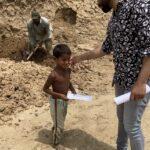
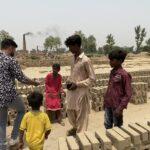
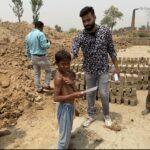

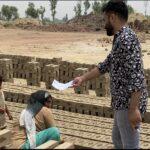
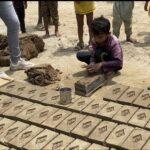
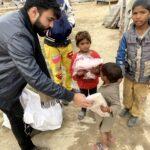

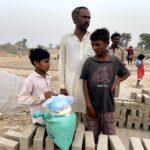
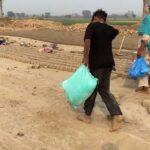

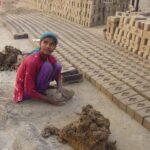
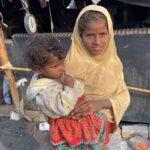
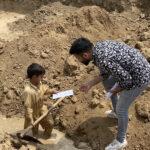
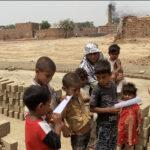
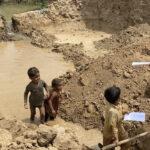
What Our Ministry is Doing for Brick Slaves
From Past two years Holy Heaven Ministry Helping Several Bricks Slave Families by Providing them Monthly Food, Medical assistance , Warm Clothes and Clothes.
- Monthly Food is our Main priority because it is basic need of all , we can live without anything but if we don’t have food we will not live. Because Brick Families only Gets food one time in a day (sometime not) which is not enough specially for Children, That’s why we are helping several bricks families with their basic need Food which is helping them to stay alive and work.
- Medical Assistance is Also essential for Brick families specially children Because working in Hot and Cold condition they got sick So we help them with Medicine which Help them in Speedy Recovery.
- Warm Clothes is Also our Main priority Specially For Children, Because Mostly in Summer Children face several issues like sickness, Flu , Cough and coldness. Warm clothes , we give them which, helps them to stay warm so and help them to stay safe from getting illness.
- Clothes we give them Often on Christmas due to which they feel happy and celebrate Jesus Birthday like other children’s. Every Year on Christmas our Team also bring Cake Brick Klin where we celebrate Jesus Birthday Cake cutting ceremony with them also Make Them very Happy.
- Spiritual Growth We are also helping them in their Spiritual Growth by teaching word of God through Monthly Meeting and Sunday School.
Less Amount of families indicate that this family is new slave and they don’t get interest rate yet on the Others Hands Higher amount indicate that family is slave from Many years even their generation to generations are working here. (Note :- Higher Amount of Family also indicate that this family have interest rate of many years which is higher than the actual amount of Loan the Took.
We can’t post these families online to choose from but when they are set FREE we can send you pictures of the entire process. You will receive a report of the family before they are set FREE and then after they are FREED. Or you can call us and tell us what you would like to do. We would love to talk with you!
Want a real joy in life? Give to setting a family FREE and you will bless them for a lifetime plus they will reach others who will reach others. Claim Isaiah 58:6-8 as you sow!
Iqbal Masih:
The heroic Iqbal Masih- a champion of children’ right. Iqbal was gunned down on April 16, 1995 in Muridke, his hometown, as he had been raising voice against the prevalent child labor.
Iqbal Masih was targeted for the reason that he was instrumental in freeing 3000 bonded labour children- the majority of them being Christians. Though his life was cut short, Iqbal Masih, has been an inspiration. His commitment to save others, and in so doing sacrificing his own life, is a message to us all.
Freedom from oppressors will always come at a cost and so often martyrs are forgotten. We wanted his work to emancipate other victims to be remembered, that it might cement a place for acceptance of the beleaguered Christian minority in Pakistan and inspire generations of humanitarians yet to come. Iqbal Masih was born in 1983 in Muridke, a town in Punjab, Pakistan. His misery began at the age of four, when he was sold into bondage by his family. It so happened that poor lad’s family borrowed 600 rupees from a local employer who owned a carpet weaving business. Since the Christian family was unable to return the loan along with interest rate, Iqbal was required to work as a carpet weaver at the lenders’ until the debt was paid off.
During the years of his slavery, Iqbal used to rise before dawn and set off for the carpet weaving factory, as he later revealed, he and most of the other children were tightly bound with chains in order to prevent them from escaping. He told that he was made to toil, 12 hours a day, and seven days a week sparing only 30-minutes as a breather. For all his hard labour, he was paid only 3 cents a day, nevertheless whatever he did, the loan just got bigger and bigger on the poor Christian family.
At the age of 10, he made up his mind to break away from his slavery. Despite the fact that he was underdeveloped as a result of malnutrition and weakened by lack of exercise, still he and a few of his friends managed to run away. After fleeing, he approached a local police station and explained how their employer was beating the children and keeping them as slaves. Regrettably, the police officer was more willing to receive the “finder’s fee” for escaped child slaves and thus returned Iqbal to the factory’s owner. The tragic return was horrible then before, as the factory owner chained him to a carpet weaving machine and forced him to work; often times subjecting him to physical abuse and starvation.
Regrettably, the police officer was more willing to receive the “finder’s fee” for escaped child slaves and thus returned Iqbal to the factory’s owner. The tragic return was horrible then before, as the factory owner chained him to a carpet weaving machine and forced him to work; often times subjecting him to physical abuse and starvation.
Two years later, he managed to reveal his misery to a brick layer union leader, named Ehsan Ullah Khan who made successful efforts to free Iqbal from bondage. The 12-year-old, Iqbal became a high up leader of the anti-slavery movement in Pakistan. He attended the Bonded Labour Liberation Front (BLLF) School for former child slaves and quickly completed a four year education in only two years.
The BLLF started sending him to speak at conferences and demonstrations all over the country. As a result of his powerful and moving story, soon Iqbal Masih began visiting other countries, in order to raise awareness of child slavery and advocating for their freedom. Everywhere he went he inspired others to become involved in the mission to end child slavery.
“I would like to do what Abraham Lincoln did… I would like to do it in Pakistan” -Iqbal Masih